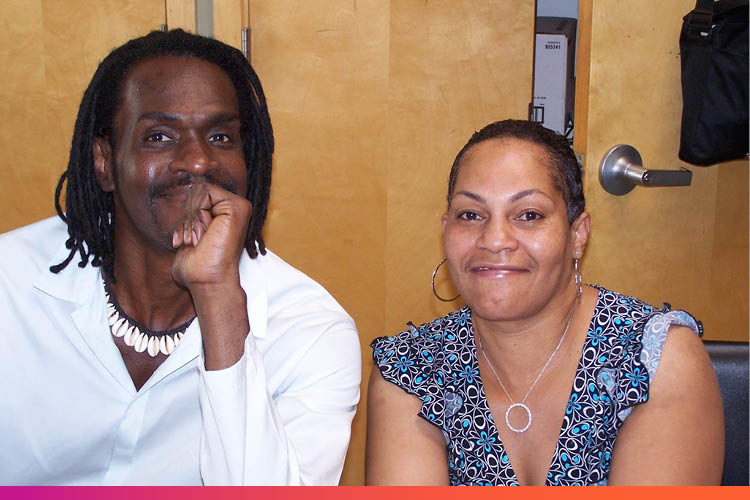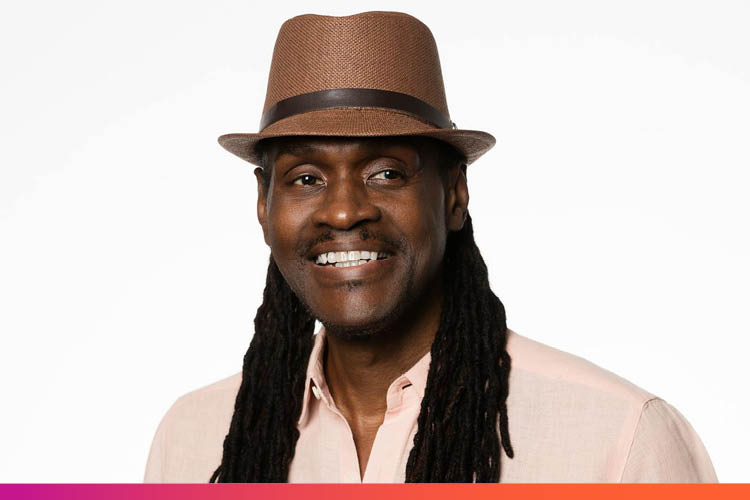As part of Whitman-Walker’s 40th anniversary, officially January 13, 2018, we’re sharing 40 stories to help tell the narrative of the Whitman-Walker community. Please meet Tony Burns! A native Washingtonian, Tony shares his memories of growing up in Northwest and Southeast DC, in the aftermath of the 1968 assassination of Martin Luther King, Jr. He highlights his journey of care with Whitman-Walker’s Austin Center and becoming a peer mentor with the +1 Peer Mentor Program.
Click the orange play button below to hear Tony’s 2018 oral history – a recorded interview with an individual having personal knowledge of past events.
Five Quotes from Tony’s Oral History
On the Atmosphere Around Sexual Health in his Home Growing Up:
“I had five sisters, one has proceeded me in death. None of my sisters was ever taught about sex by my mother other than saying, ‘Don’t bring any babies in here.’ My mother did not talk to me a lot about sex, hardly any. I’ve come to realize that was pretty commonplace for my peers in my neighborhood. And with that being said, you can imagine there was no talk health-wise about sex. Later on, as my mother and I began to speak frankly, I was the firstborn and the only son to my mother. She and I were extremely close. She grew up without her mother and her father. My mother did not know her parents. She had it hard. My mother contracted syphilis when she was 13 or 14 years old, and she did not know it. And she was staying with people who are not her family, and her hair started to fall out. And someone had turned her name into the department of health, and so there were social workers out in the street searching for this teenage girl with syphilis who happened to be my mother. And it wasn’t until many years later that my mother recalled that event in her life to me. So, it would be safe to say that there was nobody talking to me about sexual health as it related to being a same-gender loving man.”
On His First Experience at a Gay Bar in DC:
“Yeah, it was. During that time, where a lot of black gay people were meeting was in the bar. So, I went to my first bar when I was 20 years old. And that was really an awakening. I´d never seen so many people in my life that were black and that were gay. Some were flamboyant, some were masculine looking. You had in between. There were men dancing with each other. There were men made up to look like women. It was just crazy [chuckles]! And in that process when my sex life began, over probably the course of two to three years did I find out about venereal diseases and where to go.”

On His First Memory of HIV:
“It was 1981, and there’s a paper, a local gay paper here, it’s an institution it’s called [The Washington] Blade. And I was at work. I worked for the Department of Interior, the main interior. And I had a good buddy who worked for the private sector blocks away from me. And we talked on my lunch hour, we were both at work. And he had been to San Francisco, I had not. And we were both reading about a mysterious disease that was coming out of San Francisco. And it was attributed to or amongst the gay men, the white gay men who were frequenting bathhouses in San Francisco and how bizarre that was. And arrogantly and ignorantly I said to him, ‘But we won’t ever have to worry about that, because we are not white men and I have never been to a bathhouse.’ That was what I said the first time I heard about HIV.”
On Receiving His HIV Test Results:
“Well, the appointment coincided with Friday the 13th. That was an awful day. I´m not all that superstitious [chuckles], but you know like why does it have to be on that day? But I went and went into the small room and this guy comes in and he says, ‘Mr. Burns, you know why you are here.’ I said, ‘I am.’ He said, ‘Can you tell me why you’re here?’
I said, ‘I’m here to get the results from my HIV test.’ And he said these words, ‘Mr. Burns, I´m sorry but you’ve tested positive for HIV.’ And I heard him the first time. I don’t know what my face was looking like to him, but whatever my face was looking like to him, he leaned forward and touched me on the knee and said, ‘Mr. Burns, did you hear me? You’ve tested positive for HIV.’ And I said, ‘I heard you.’ How it felt? It felt like I was going to die.”

Tony in Whitman-Walker’s 2016 We See You campaign photoshoot.
On the Transformative Moment that Inspired His Work as a Peer Mentor:
“So, being a part of the Austin Center have caused me to come in contact with some of the other staff at Whitman-Walker. There was a guy, a nurse, by the name of Justin Goforth. He’s a legend, even now. He doesn’t work for Whitman-Walker anymore. He had a group called ‘Living Well’ where he would have doctors and nurses and the like, and they would come give us seminars A-Z about HIV, and they provided dinner. Well he said to me, one time he said, ‘You know, we think that we might have a program where it’s going to be a mentoring program.’ He said, ‘And you´re one of the first people that I thought of.’ And I’m like, ‘Really?’ So, he said this in passing. I was helping him clean up. He had had a group.
Shortly after that he and a colleague, Meghan Davies, came and found me in the Austin Center one day. And I’m like, ‘What’s up?’ And they said, ‘Tony, we have a guy that just came in and he tests positive, and he’s not handling it well.’ They said, ‘He´s a young, black guy and we were wondering if you would talk to him?’
So, I said, ‘Me?’ And they was like, ‘Yeah.’ And they both looked at me and said, ‘Tony, you know, we could talk to him. We’ve talked to him and we’re trained. We’re not a black, gay guy. You are. We thought maybe it could help. We hope it can’t hurt.’ So, I did. And I go in this room with them and I look at him, and he’s looking like his world has collapsed. And I tell him my name, and he’s looking at me like, ‘Now, they don’t – got this damn black guy to come talk to me. What is he going to say? He can’t take this away.’ His eyes just looked frantic.
And so I said to him, ‘I know how you feel. I´m living with HIV too.’ Then his eyes began, which were all going all around, began to focus on my face when I said I had HIV too. I said, ‘And I’ve been managing it, living with it,’ manage wasn’t in my vocabulary as relates to HIV. Then I said, ‘I’ve been living with HIV for 17 years. And then I had his attention. And I don’t believe anything was fake. I was 31 years old when I was diagnosed. He was 31 years old. And I said, ‘My prayer and hope for you is that you live as long as I have, and that when you’re my age you get to tell somebody your age that you are now, that they can still make it, if there has not been a cure for it.’ That was the moment that catapulted me and made me believe that what little I had maybe it could be of use to somebody else.”


